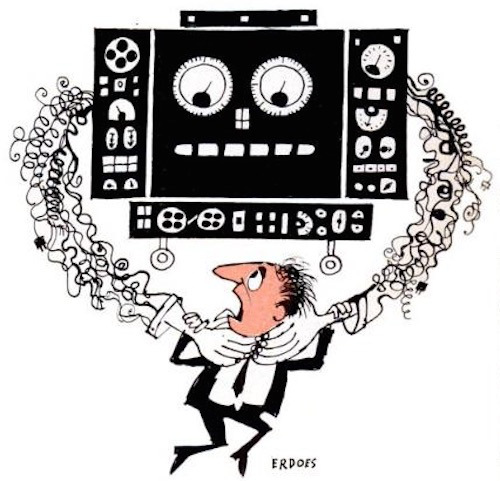Nicholas Carr's Blog, page 21
May 22, 2015
Prove your humanity
May 21, 2015
Ladies of the code
That 1961 Life article about computers also gave a snarky nod to the important role that women were playing in mainframe programming:
Within the New Class [of computer experts] are more than 30,000 people, including hundreds of attractive young ladies who have studied computers at such colleges as Vassar. They are concerned not with the executive problems of how to use computers but with How to Talk to the Machine. They have their own language and like to discuss such things as automorphisms,...
“The machines are taking over”

Our computers advance, but our fears about them remain remarkably consistent, cycling through peaks and valleys in some as yet undiagnosed pattern. In the spring of 1961, Life magazine ran a long feature story titled “The Machines Are Taking Over: Computers Outdo Man at His Work — and Soon May Outthink Him.” It made for unsettling reading.
“The American economy,” reported the writer, Warren R. Young, “is approaching the point of no return in its reliance on computers.” He provided a long lis...
May 20, 2015
Insert human here
I have an op-ed about how we misperceiveour computers and ourselves, “Why Robots Will Always Need Us,” in this morning’s New York Times. A snippet:
While our flaws loom large in our thoughts, we view computers as infallible. Their scripted consistency presents an ideal of perfection far removed from our own clumsiness. What we forget is that our machines are built by our own hands. When we transfer work to a machine, we don’t eliminate human agency and its potential for error. We transfer th...
May 15, 2015
Wind-fucking
Vocabulary is rarely so rich, so dense with branch and twig, as in the realm of flora and fauna.Plants and animals go by all sorts of strangeand evocative namesdepending on where you are and whom you’re talking with. One localterm for the kestrel, reports Robert Macfarlane in an article inOrion, is wind-fucker. Having learnedthe word, he writes, “it is hard now not to see in the pose of the hovering kestrel a certain lustful quiver.”
I’m reminded of Seamus Heaney’s translation of a Middle En...
May 13, 2015
Smart-tech smackdown
Forget Mayweather and Pacquiao. Tonight in New York, Intelligence Squared ishosting a debate on the proposition “Smart Technology Is MakingUs Dumb.” Arguing for the proposition will be Andrew Keen and I. Arguing against it will be Genevieve Bell and David Weinberger. The event is sold out, but you can watch a live stream, starting at 6:45 pm edt, here.
April 15, 2015
A decade of blogging
Today is Rough Type‘s tenth birthday. If I’m calculating correctly,that’s eighty in human years.
Atransmigration of the blog would seem tobe in order.
Image: Strolic Furlan-Davide Gabino.
April 14, 2015
Theses in tweetform (fourth series)
[first series, 2012]
1. The complexity of the medium is inversely proportional to the eloquence of the message.
2. Hypertext is a more conservative medium than text.
3. The best medium for the nonlinear narrative is the linear page.
4. Twitter is a more ruminative medium than Facebook.
5. The introduction of digital tools has never improved the quality of an art form.
6. The returns on interactivity quickly turn negative.
7. In the material world, doing is knowing; in media, the opposite is...
April 13, 2015
What do robots do?
Yesterday I posted anexcerptfrom the start of Paul Goodman’s 1969 NYRB essay “Can Technology Be Humane?” Here’s another bit, equally relevant to our current situation, from later in the piece, when Goodmanturns his attention to automation, robots, and what we today call “big data”:
In automating there is an analogous dilemma of how to cope with masses of people and get economies of scale, without losing the individual at great consequent human and economic cost. A question of immense importa...
April 12, 2015
The prudent technologist
Paul Goodman, 1969:
Whether or not it draws on new scientific research, technology is a branch of moral philosophy, not of science. It aims at prudent goods for the commonweal and to provide efficient means for these goods. At present, however, “scientific technology” occupies a bastard position in the universities, in funding, and in the public mind. It is half tied to the theoretical sciences and half treated as mere know-how for political and commercial purposes. It has no principles of i...











